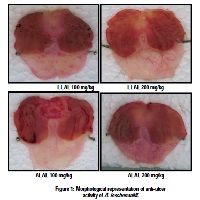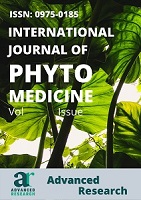Evaluation of Anti-Ulcer Activity of ArisaemaLeschenaultii
Keywords:
Antiulcer activity, Herbal drug, AntioxidantAbstract
Ethanolic and Aqueous extract of ArisaemaLeschenaultii was evaluated for its Antiulcer activity against naproxen induced ulcer. Different extracts of blume of A. leschenaultii gave dose dependent increase in anti-ulcer activity against naproxen induced ulcer. Ethanolic extract of blume of A. leschenaultii showed better ulcer inhibition (55.8%) as compared to AEAL (36.5%). The present investigation revealed that ArisaemaLeschenaultii exhibited significant antiulcer activity by enhancing antioxidant potential of gastric mucosa thereby reducing mucosal damage.
References
. Kirtikar KR and Basu BD. (1985).
“Indian Medicinal Plant" Vol IV, Lait
Mohan Basu Publisher, Allahabad;
. Kumari MR and Narasimhan D.
(2003). Abortifacient and
contraceptive plants used by
Malayalis of Javadhi hills. Journal of
economic and taxonomic botany.
(4): 788-790.
. Satyanarayana MN. (1962). some
new probable sources of
Fructosans. Current science
(12): 507-508.
. Kim J, Kimb SY, Songe G, Parkd J
and Changa H. (2005). Protective
effect of astaxanthin on naproxen
induced gastric antral ulceration in
rats. European Journal of
Pharmacology 514: 53-59.
. Roldao EDF, Witaicenisa A, Seitoa
LN, Hirumalimab CA and Satasi
LCD. (2008). Evaluation of the antiulcerogenic and analgesic activity of
Cardiaverbenacea DC.
(Boraginaceae). Journal of
Ethnopharmacology 119: 94-98.
. Cioli V, Putzolu S, Rossi V, Scorza
BP and Corradino C. (1979). The
role of direct tissue contact in the
production of gastrointestinal ulcers
by anti-inflammatory drugs in rats.
Toxicology and Applied
Pharmacology 50: 283-289.
. Parks DA. (1989). Oxygen radicals:
Mediators of gastrointestinal
pathophysiology. Gut 30: 293-298.
. Wallace JL, Keenan CM and Granger
DN. (1990). Gastric ulceration
induced by nonsteroidal antiinflammatory drugs is a neutrophil
dependent process. American
Journal of Physiology 259: 462-467.
. Rainsford KD. (1983). Microvascular
injury during gastric damage by antiinflammatory drugs in pigs and rats.
Agents and Actions 13: 457-460.
. Vaananen PM, Keenan CM, Grisham
MB and Wallace JL. (1992).
Pharmacological investigation of the role
of leukotrienes in the pathogenesis of
experimental NSAID gastropathy.
Inflammation 16: 227-240.
. Appleyard CB, McCafferty DM,
Tigley AW, Swain MG and Wallace
JL. (1996). Tumor necrosis factor
mediation of NSAID induced gastric
damage: Role of leukocyte
adherence. American Journal of
Physiology 270: 42-48.
. Green FW, Kaplan MM, Curtis LE
and Levine PH. (1978). Effect of
acid and pepsin on blood
coagulation and platelet
aggregation. A possible contributor
prolonged gastroduodenal mucosal
haemorrhage. Gastroenterology 74:
-43.
. Wallace JL and McKnight GW.
(1990). Themucoid cap over
superficial gastric damage in the rat.
A high pH microenvironment
dissipated by nonsteroidal antiinflammatory drugs and endothelin.
Gastroenterology 99: 295-304.
. Schmassmann A, Tarnawski A and
Peskar BM. (1995). Influence of acid
and angiogenesis on kinetics of
gastric ulcer healing in rats:
Interaction with indomethacin.
American Journal of Physiology 268:
-285.
. Perini RF, Ma L and Wallace JL.
(2003). Mucosal repair and COX-2
inhibition. Current Pharmaceutical
Design 9: 2207-2211.



